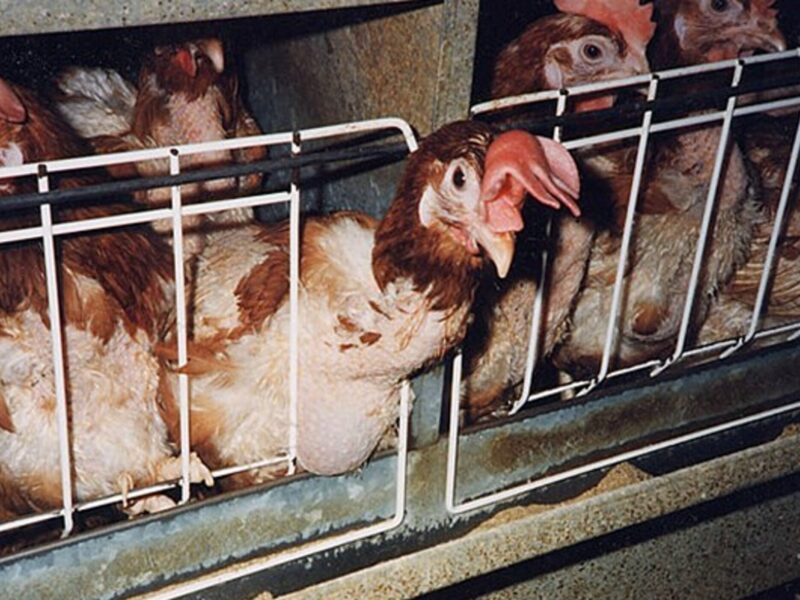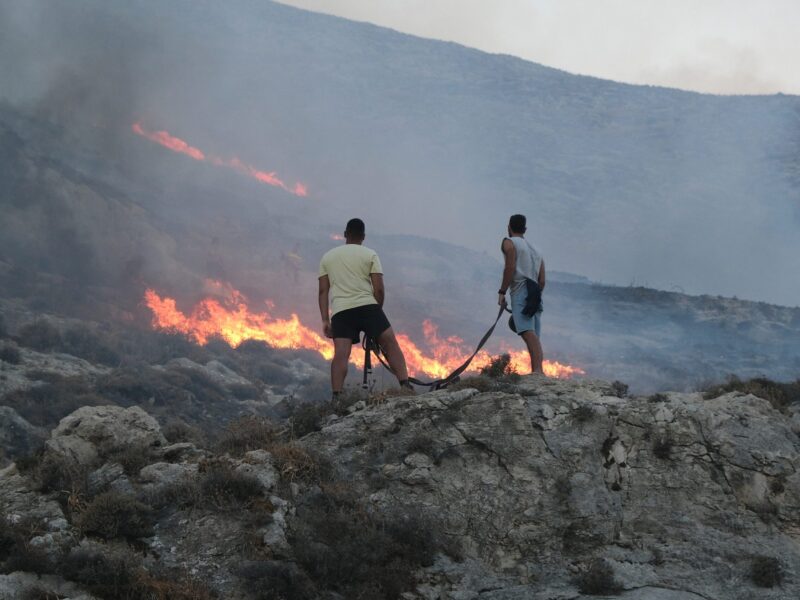
‘Our disrespect for wild animals and our disrespect for farmed animals, has created this situation’
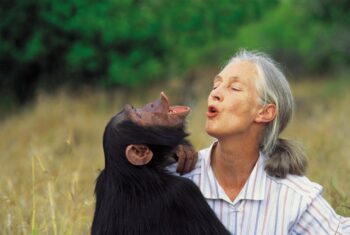
Jane Goodall and a chimp | Credit: Michael Neugebauer
This week, I had the huge privilege of introducing wildlife legend Jane Goodall, PHD, DBE, Founder – The Jane Goodall Institute and UN Messenger of Peace, to the global webinar, ‘Pandemics, wildlife and intensive animal farming,’ organised by Compassion in World Farming. The event, featuring European Commissioner for Health and Food Safety Stella Kyriakides, together with the Commissioner for Agriculture, Janusz Wojciechowski, brought together Members of the European Parliament (MEPs) and over 1,300 participants.
This webinar could not have taken place at a more relevant and urgent time with Covid-19 acting as a clear demonstration of the fragility of society and the need for us to find a better, more sustainable future.
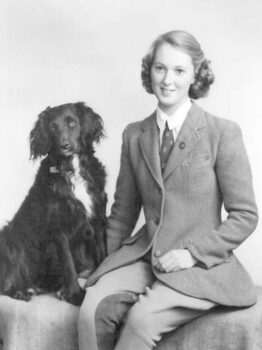
Jane with Rusty. Taken in Bournemouth 1954. Written on the back: “Jane and Rusty, the Inseparables” | Credit: Jane Goodall
It’s hard to believe that in her youth at University, Jane Goodall was criticised for naming rather than numbering chimpanzees. Nor could she talk about their personalities. Her professors described that as a sin, because “Only humans can have personalities“. But Jane had been taught differently by her childhood dog, Rusty.
Jane recounted her first ‘experiment’ with farm animals as an eight-year old. She taught Grunta, a free-range pig, to take her apple core. It was a connection with a farm animal of lasting importance and Jane reminded us all that pigs are more intelligent than dogs. In sharing her “very favourite” video of Pigcasso she shared her belief, that stories like Pigcasso help a wider audience to recognise the sentient being behind their bacon and sausages: “It’s one thing to say a pig is as intelligent as a dog but it’s another to show a pig full of joy”.
Environmental destruction
Jane told of her distress when witnessing environmental devastation caused by intensive farming and cattle grazing during her travels to Argentina and Africa. She said, “I was shocked the other day to learn that more grain is grown to feed animals than people, and in many parts of the world, as you know, people are starving. What’s more, these animals …have to be given more and more antibiotics… leading to the development of superbugs.
“What has happened to this planet is terrifying,” Jane added.
As an inspirational speaker, Jane prefers to talk about hope and drew attention to the growing awareness of the impact humanity is having on animals, both farmed and wild, and on the environment: “As people become more aware, there are more voices joining a chorus of people trying to do things differently”.
Protecting people means protecting animals too
Jane talked about the current pandemic and diseases spilling over to people from farmed animals and wildlife through our poor management and abuse of these creatures.
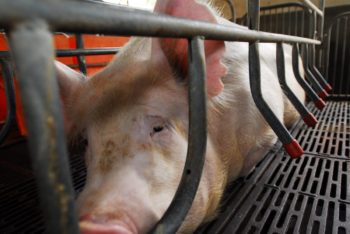
Sow in a farrowing crate | Credit: Compassion in World Farming
“We have brought this on ourselves and it is because of our absolute disrespect for the environment and for animals,” she exclaimed. ”It’s the hunting, killing, eating, trafficking of animals. We have so much to learn about animal intelligence, even insects can learn to do things by watching others. It’s such a rich field of enquiry – animal sentience, animal intelligence and animal emotions. The point I am trying to make here is that every one of those billions of farm animals and every one of those billions of trafficked animals are individuals. With personalities, capable of feeling fear, of distress and certainly of feeling pain. And when you start thinking of them as individuals, that really gets you to grips with the enormity of what we have done. We have inflicted millions, millions and millions of sentient animals with horrible suffering and we are still inflicting it now, today.
“This pandemic is a wake up call, a call to action. World leaders are just itching to get back to business as usual but if we do that, it will lead to the end of our species tenure on planet Earth.
“I am just praying that the groundswell of people who understand that if we don’t do things differently, we are finished. But we have a window of time to get together and make our voices heard. Every single day we make an impact on the planet, we just have to choose what kind of impact we want to make.”
It proved to be a hugely moving Webinar by a wonderful human being, losing nothing in being online: if you missed it, treat yourself to the most amazing listening experience here.
And dear Dr Jane Goodall, thank you for being the most wonderful ambassador for animals, the environment and a compassionate future for everyone.
If you have also been moved by Jane’s words, please join us. Compassion in World Farming is calling on the world’s most influential organisations, including The World Bank, the United Nations and the World Health Organisation, to replace factory farming with a food system that respects animals, nurtures our planet, and reduces the risk of pandemics.
Please use this link to sign our petition and join the call for a future without factory farming.
Thank you.


